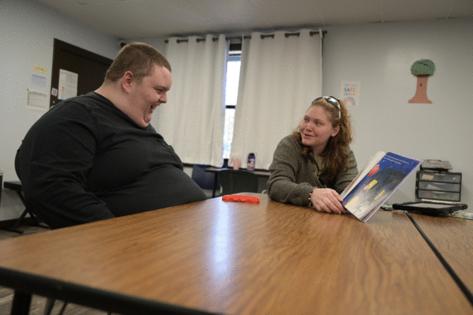Colorado has lost dozens of autism clinics as state struggles to shore up funding
Published in Health & Fitness
For the first time in years, Jay Ortengren has seen his 16-year-old son, Ethan, reach milestone after milestone as he lives with a severe form of autism.
Ortengren and his family uprooted their lives in search of the best treatment for Ethan after he was diagnosed as a young child. Finally, they seemed to find it when they moved to Jefferson County, Colorado, during the pandemic. At Seven Dimensions Behavioral Health, Ethan has benefited from true wrap-around services, with two-therapist teams helping him for 40 hours a week.
Ethan began hitting goals with his motor functions, social skills and sensory tolerances, his father said. His attention span grew from just one or two minutes to 30.
But the exodus of autism treatment clinics from Colorado in recent years have Ortengren worried that any progress might be fleeting. Reimbursement rates under the state’s Medicaid program, or how much the state pays for treatments, continue to fall short of the cost of business, advocates say, raising worries the industry could soon fall into a spiral it can’t escape.
A recent boost in funding has helped, though Ortengren still frets that the state support that’s meant so much for his son will dry up.
Ethan’s progress, and the level of treatment he qualified for in Colorado, were enough that Ortengren was able to start working full-time again.
“If you were to take (services) away tomorrow, Ethan would backslide and he would suffer, and the family would suffer,” said Ortengren, whose family moved to Colorado from Virginia.
Since 2021, at least 13 companies — operating about 35 clinics of different sizes — have closed or left the state over reimbursement rates that haven’t kept up with rising costs, according to research by the Colorado Association for Behavior Analysis. Those closures have affected treatment for some 1,380 patients, and an estimated 1,000 Coloradans lost their jobs, according to the group.
“Colorado is relatively unique in the Medicaid landscape right now because of the number of programs that have closed and/or exited the state,” said Mariel Cremonie-Fernandez, the vice president of government affairs for the national Council of Autism Service Providers.
“Once they’re gone, they’re pretty much gone”
...continued
©2024 MediaNews Group, Inc. Visit at denverpost.com. Distributed by Tribune Content Agency, LLC.







Comments